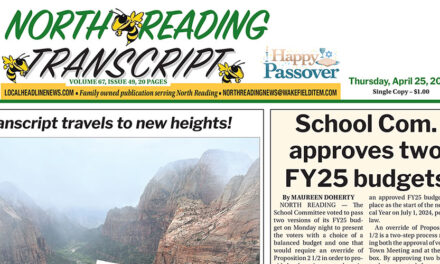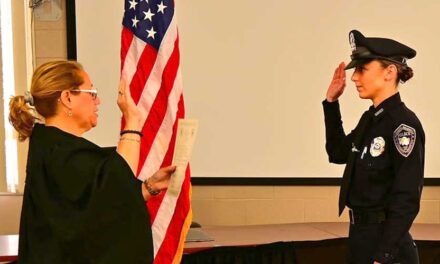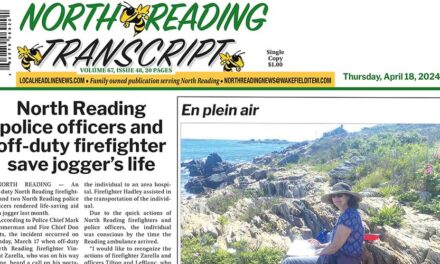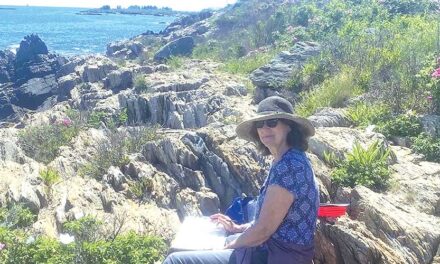Published October 17, 2019
By MAUREEN DOHERTY
NORTH READING — The fate of a proposal to pave Swan Pond Road took as many twists and turns as the 2,700-foot private gravel road itself.
Whenever it comes up for discussion, be it at a Town Meeting, a Select Board meeting or a workshop with the neighbors, the debates, scenarios and “what-ifs” are endless; each question generates a new answer and each answer results in a new set of circumstances to consider. Each discussion takes an hour to 90 minutes to hash out.
After another such marathon session at October Town Meeting, the proposal of whether the town should spend $175,000 from Free Cash to be set aside in a gift account and only used if the residents also deposit another $175,000 in the same account eventually passed… but it was a long haul.
It should be mentioned up front that the complications for this roadway include the fact that not only is it a private road, but it leads Swan Pond, a drinking water reservoir for the town of Danvers; therefore the DEP must approve the storm water management structures and their perpetual care plan. Under existing conditions a stormwater management system does not exist and the hard packed gravel washes into the pond; several times a year the town grades the road and patches the holes.
Also, the town owns four parcels along the route and maintains Swan Pond Road along with nearly 5 miles of gravel roads in town, including 4.16 miles of unaccepted gravel roads (roads that have a layout but do not meet town roadway standards). The 2,700 linear feet at Swan Pond is included in the 0.70 miles of private gravel roads the town maintains for public safety purposes.
According to the DPW figures, 4.86 miles of gravel roads is equal to 25,660 feet. They use in-house labor, equipment and materials to take care of all these roads, at $1.10 per foot and an estimated cost of $28,300 per year (including $3,360 per year spent on Swan Pond Road) each of the last three years.
The DPW figures state it costs roughly $476,000 to construct one mile of paved roadway for an accepted street.
Ordinarily, when an unaccepted road is improved from gravel to pavement it will eventually be accepted by the town, if built to the correct standards, and then the town can count those miles toward its Chapter 90 highway funds. In the case of Swan Pond, that would be impossible as the width of the road varies from about 9 feet to 16 feet and the minimum width for an accepted street is 18 feet. Plus, since the roadway layout cuts through the lots any attempt at taking any land for a roadway layout would increase the nonconformity in the lots, which is a zoning no-no.
Other differences include the fact that those unaccepted streets that would eventually qualify for acceptance by the town benefit from the betterment provision and the cost the improvement shared with the homeowner qualifies the homeowner for 20-year financing. In the case of Swan Pond Road, 100 percent of the residents’ share must be paid to the the town first before any part of this project is begun.
From the outset, when this citizens’ petition came up at the June 2018 Town Meeting the purpose was to determine what it would take to survey the road and pave only the existing variable layout. In order to do this the existing layout has to be known and measured. Again, a lot harder than it seems. That is where the $350,000 figure comes in if the entire 2,500 feet is paved. This includes a $35,000 contingency, and one homeowner at the end of the road does not wish to participate so the pavement would stop at the property line.
But a greater complication is a property owner in the middle of the road does not want to have his two lots, totaling 350 linear feet, paved or contribute to the upgrade cost. However, there are enough residents beyond this property owner who do want the road paved and they are considering covering his fees plus their own.
The residents have asked the town to consider paving up to this lot, leaving the 350 feet of gravel untouched and picking up the pavement on the other side. If the pavement stopped after the first 900 linear feet, the total cost would be $114,000, but doing so would mean the roadway in front of the main proponents behind the citizens’ petition, Phil and Rosalie Cravotta, 223 Swan Pond Road, would not get paved.
The Cravottas first approached the town about this project in 1998, Rosalie told the voters at Town Meeting during the debate. “We worked with previous DPW directors. I have worked getting permissions signed (from her neighbors to allow the DPW and land surveyors on private property).”
“Three years ago when there was another change in DPW administration we had to start from scratch again. In these last three years we have been going through this process and Town Meetings. I feel like the town was saying they were willing to put forth this policy and Swan Pond can be used as the model. The money would be set aside in cash so if in the end it unraveled then the money goes right back to Free Cash,” she explained when the motion on Article 10 was up for consideration.
“We’ve been going through this process for a long time and were in the queue for some years and through no fault of our own, just through change in administration, we kept getting pushed to the side,” she added.
But as passionate as the Cravottas and most of their neighbors are about getting Swan Pond Road paved, there have been many just as vocally opposed to it. The entire Finance Committee voted not to recommend passage of the article; the Select Board recommendation was 4-1 in favor of passage and member Andrew Schultz opposed.
Finance Committee member Don Kelliher said his board took this up at its last meeting and “voted unanimously in opposition to this article. We are in agreement that we ought to vote to pass this over at this time for the reasons Ed McGrath and Andy Schultz brought up – this is not ready yet. There isn’t agreement among the residents as to what is going to happen with a couple of residences still holding out. There is no policy for how we are going to treat unaccepted roads in this town and doing a one off sets a precedent. We’ll be hard pressed the next time a group of residents has an unapproved road that they are building on and want to have something done. I do not know how we’d turn them down. At the same time we have serious problems with the accepted roads in this town,” Kelliher said, though he added in recents years the town has stepped up its investment creating a plan and funding roadway improvements for accepted streets.
“I want to help the folks on Swan Pond but I think our board needs a set policy on how we are going to handle these going forward,” Schultz said. “I think the board needs to articulate a detailed policy and then the residents have to sign the agreement. There is one resident in the middle who doesn’t want the road. We’re going to have a situation where we will pave the road, we will have dirt and then pavement. The policy will instruct anyone on a dirt road what they need to do,” Schultz said.
McGrath had sought to pass over Article 10 at the outset of the meeting. Toward the end of the lengthy debate, in response to a question about whether the safety of the residents is put at risk if the Fire Dept. or an ambulance cannot get to their homes, Select Board member Stephen O’Leary said it “has been an issue over the years and the town has graded it out and put a couple of turnarounds in. It is far better than it was 30 years ago, but it is still not great.”
Another resident rose to end debate by moving the question, which was unanimous. But on the voice vote to pass over Article 10, it sounded too close call by Town Moderator John Murphy, who then asked for a hand count, which failed, 152-115.
This allowed the discussion to continue under the main motion on whether $175,000 from Free Cash would be put toward the construction of a new paved roadway to replace the hard packed gravel 2,700 foot portion of Swan Pond Road.
After another lengthy debate, the article nearly failed. The initial vote by a show of hands was 116 against and 111 in favor. Then a voter requested a “standing count” which is exactly as it sounds. This time the count in favor was 116 with 90 against. A vote to reconsider was then taken by another hand count which failed 154-31. That meant that Article 10 could not be taken up again before the end of the night when the bulk of the original 547 voters had gone home.
Now the harder work begins: creating the policy at the Select Board on how to handle future such requests and for the residents, raising those upfront funds.




